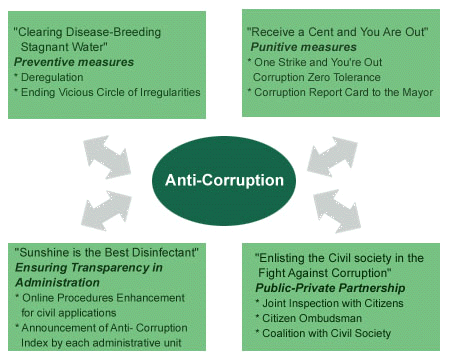
Welcome to PhilippineUpdate.com's Solutions Page
This won't be the most exciting section of this Web site, but hopefully it will have the most impact. The goal is to create a database of tried-and-true approaches to community and national problems. We will actively capture best practices in governance and problem management, drawing practical lessons from local cases as well as from around the world. Coverage will be broad, including the most pesky issues of poverty, crime, corruption, pollution, traffic, et cetera.
It's fun and easy to criticize, but it's not enough. We need to balance all the bashing (which is often directed against our own people and culture) with positive suggestions, and we ask all readers to help in this endeavor.
The information that we need in our database includes the following:
Success stories, both in the Philippines and around the world, with as much data as possible
Contact information (persons directly involved in the cases cited)
Studies, ideas, and concepts directly related to the issues
URLs of Web sites that have useful information
Information we gather will be made available online for all to access. The target audience includes local and national leaders, policy makers, NGOs, activists, academics, students, and concerned citizens. We will be proactive in reaching the right people if necessary (e.g., if we know that we have a potential solution to a pressing issue, we will make sure the people involved know their options).
We share problems, so let's share solutions. With today's easy access to information, there is absolutely no need to reinvent the wheel every time we encounter the same problems. Let's "huddle" and make our people's lives easier together. Send your input to mbionat@post.harvard.edu. Credit will be given to the sender (unless anonymity is requested).
If you want to make a comment without being edited, feel free to go straight to the Public Forum section.
Crime | Corruption | Pollution | Poverty | Traffic | Waste Management |
Case: Seoul City's anti-corruption efforts: A systemic approachSeoul Metropolitan Government (SMG) has adopted systematic anti-corruption approaches, simultaneously pursuing four major lines of action: preventive measures, punitive measures, increased transparency in administration, and enhanced public-private partnership.
SMG is actively promoting deregulation in all areas of administration. Excessive municipal regulations have been either abolished or eased. As an old saying goes, "stagnant water breeds disease." A public official assigned to one place for too long may develop a patron-customer relationship in his or her jurisdiction.
To eliminate potential collusion, we abolished the long-standing practice of assigning jurisdiction over a specific area to one individual in the fields of permits, approvals, and inspections. Officials are now assigned on a daily basis to handle applications submitted from different areas. Also, a personnel reshuffle on a massive scale was carried out for every single wrongdoing.
In baseball, a batter is called out after three strikes. In Seoul, city officials are punished for every single wrongdoing.

Source: Excerpt from the Seoul Metropolitan Government Web site
Primers
Related Web Sites
Contact Information:
Case: Accion International provides microcredit to Latin America's poorest
In Latin America, Accion Internacional, a non-profit development agency, and its affiliates was reported to have disbursed in the past 5 years $1 billion in loans to poor microentrepreneurs. Its first-time loans are between $100 and $200, and the overall repayment rate is above 98 per cent. Its network of 19 affiliates in Latin America and North America provides $300 million a year in loans to poor entrepreneurs (56 per cent of whom are women). Since 1987, Accion's network has grown from 13,000 to more than 285,000 active borrower clients. The six largest affiliates now provide $1 million per month in loans. Banco Solidario of Bolivia, which has grown from a credit-providing non-governmental organization to a fully licensed commercial bank, provides financial services to 67,000 people, more than one half of the total number of clients in the entire Bolivian banking system. The Association for the Development of Micro-Entreprises of the Dominican Republic and Accion Comunitaria del Peru are reported to have achieved sustainability.
Source: Excerpt from "Role of Microcredit in the Eradication of Poverty" Report of the UN Secretary General
Web Sites
Case: Las Piņas receives the United Nations Environment Program award for its zero waste management program
With a population of 494,875, the average daily garbage collection in Las Piņas is about 700 cubic meters. Three years ago, the city decided to buy 40 compactor trucks and two dump trucks. After 3 years of operation and because of its decision to have the operations managed by private contractors, UNEP said, Las Piņas saved P140 million and garbage is now rarely seen on the streets.
Through the Clean and Green Council, Las Piņas has organized a group of environment-conscious students. Every weekend, all public schools conduct clean-up activities. Environmental awareness is also included in the students' subjects, and essay and painting contests and seminars are organized.
Business establishments are encouraged to help through the Adopt-a-Barangay program. Companies donate plastic garbage bags for distribution to the different barangays.
Las Piņas maintains 70 tree parks and playgrounds in almost every barangay. Trees and ornamental plants have been planted and landscaped and nurseries are maintained.
Source: Excerpt from the Philippine Star Online (6/3/00)
SEND SOLUTIONS TO PHILIPPINEUPDATE.COM.